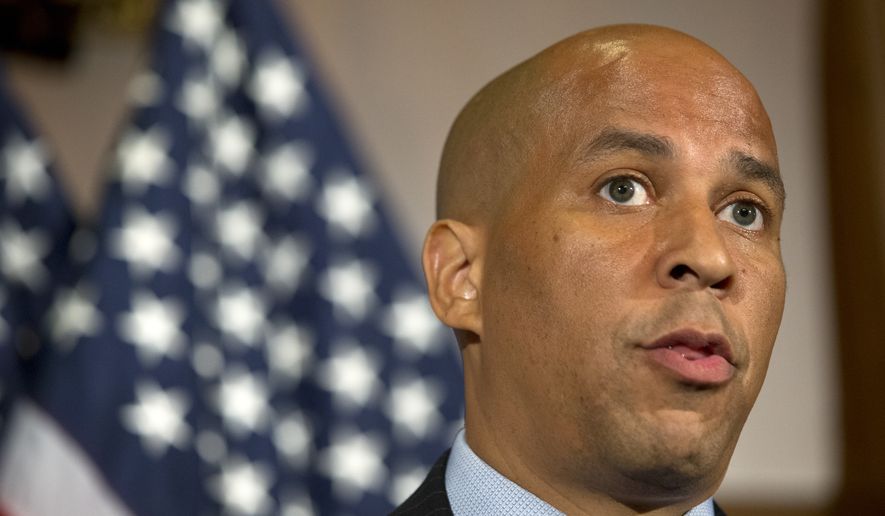Sen. Cory Booker, New Jersey Democrat, introduced a bill Tuesday that would remove marijuana from the country’s list of federally controlled substances and retroactively expunge prior cannabis convictions.
“For decades, the failed War on Drugs has locked up millions of nonviolent drug offenders — especially for marijuana-related offenses — at an incredible cost of lost human potential, torn-apart families and communities, and taxpayer dollars,” Mr. Booker said in an address Tuesday introducing his Marijuana Justice Act.
“This (legislation) is the right thing to do for public safety, and will help reduce our overflowing prison population,” the Garden State’s junior senator added.
Specifically Mr. Booker’s bill would remove weed from the government’s list of Schedule I substances and void federal convictions for marijuana use and possession, effectively giving millions of inmates a chance at early release. It would also allocate federal funding to states that loosen their own marijuana laws and withhold money from those that don’t, incentivizing states to rethink their policies with respect to pursuing and prosecuting marijuana users.
“Our country’s drug laws are badly broken and need to be fixed,” Mr. Booker continued. “They don’t make our communities any safer—instead they divert critical resources from fighting violent crimes, tear families apart, unfairly impact low-income communities and communities of color, and waste billions in taxpayer dollars each year.”
“Descheduling marijuana and applying that change retroactively to people currently serving time for marijuana offenses is a necessary step,” he added.
The federal government currently classifies cannabis as a Schedule 1 substance, putting the plant in the same category as heroin and ecstasy. Dozens of states have legalized marijuana for medical or recreational purposes, however, and more than half the country favors full legalization, according to recent polling.
States spend a combined total of about $3.6 million enforcing marijuana laws each year, and about 88 percent of the over 8 million individuals arrested for weed crimes between 2001 and 2010 subsequently served time for possession, according to the American Civil Liberties Union.
“This is the single most far-reaching marijuana bill that’s ever been filed in either chamber of Congress,” Tom Angell, chairman of the pro-pot group Marijuana Majority group said in a statement. “More than just getting the federal government out of the way so that states can legalize without [Drug Enforcement Administration] harassment, this new proposal goes even further by actually punishing states that have bad marijuana laws.”
Mr. Booker’s proposal was quick to garner pushback from lawmakers on either side of the aisle, however.
“I’m not there. I think there’s a lot about marijuana we don’t know,” Sen. Dianne Feinstein, California Democrat, told Rolling Stone. “I think marijuana has potential dangers to it.”
“I do not support a national, a federal effort to decriminalize marijuana,” added Sen. Susan Collins, Maine Republican. “We’re in the midst of an opioid crisis in this country, and I think the last thing we need is for the federal government to send a signal that marijuana should be legalized across this country.”
Mr. Booker introduced a related bill in June, the Compassionate Access, Research Expansion, and Respect States Act, offered to prevent the federal government from interfering in state-sanctioned medical marijuana programs. It was referred to the Senate Judiciary Committee but has been dormant ever since.
• Andrew Blake can be reached at ablake@washingtontimes.com.




Please read our comment policy before commenting.